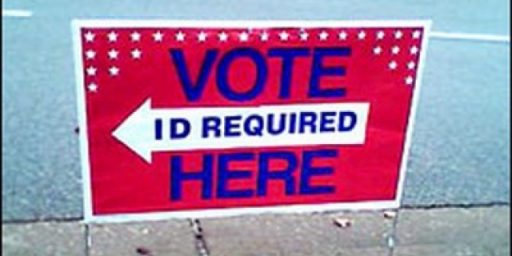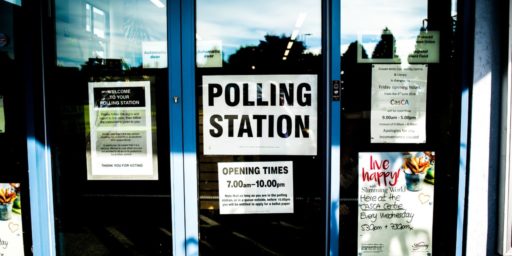A Question: Contacting Someone Else’s State Senator?
Here’s a question for discussion: is it appropriate for a citizen in one state to write an e-mail/make a phone call/send a fax/etc. to an elected representative in another state in the hopes of influencing their vote in that state’s legislature?
The proximate cause for asking the question is Jim Hoft’s posting of contact information of Wisconsin State Senators and his request that his readers “PLEASE take a minute and drop them a note of support.” He also asked for a specific message be sent to one GOP member who appeared willing to entertain a compromise.
I must confess that my main reaction to this notion is that persons who are not part of the electoral constituency of a given elected official should refrain from trying to influence the actions of that official, especially in a case like Wisconsin, since most us don’t live and vote in Wisconsin.
This kind of thing usually emerges on national issues and there may be requests by activists that call specific members of Congress. This, too, strikes me as problematic if the specific member in question does not represent the caller/e-mailer (although at least in that case we are talking about the national legislature).
Thoughts?






There was a related question in my home state several years back about out-of-state campaign contributions for state matters. On the one hand, it was pretty obvious why the Governor had such loyal friends in neighboring states (he was against liberalizing gambling laws and the casinos in neighboring states got a good chunk of change from residents of my state driving over), but on the other hand… freedom of speech.
I know that websites of Members of Congress require you to put in a ZIP code and will reject notes from outside their states and districts. And I’d argue that there’s more rationale for non-constitutions to contract Members, since their votes nonetheless affect us. There’s no such rationale for state legislators.
Sure, people have a right to contact the state reps if they feel the issue will affect them in some way. But on the flip side, I wouldn’t put any expectation on the rep to listen. It’s a bit like writing a letter to a company that you have never bought anything from and then expecting them to change. You are welcome to do it, but they are also welcome to ignore you.
I’ve always felt odd even contacting members of the U.S. Congress who don’t represent me. I’ve done it, granted, but not often, and then only on issues of national impact.
I’ve never even had reason to consider contacting some other state’s elected officials. I suspect that if I did, the impact would be minimal. A local politician really doesn’t have reason to worry about what people in other counties/states think, unless there’s money or his/her future career prospects to consider. Hoft’s call for support might be effective in this case – Governor Walker seems like the type who’d have presidential aspirations, and signs that the country agrees with his stance may very well keep him stubborn – but in general I can’t see the point, which is probably why such calls for action are rare.
I’m inclined to agree on contacting other people’s representatives for many reasons. Biggest reason is it is a waste of time. My understanding is when taking calls on contentious issues staffers don’t count votes/opinions of non-constituents. Having said that, I understand people feeling different based on fears of federal bailouts for irresponsible state governments.
Obama made it national, did he not?
Anyway, I sort of think this would be highly ineffective.
Obama made it national, did he not?
How did he do that, exactly?. Laws passed by the state legislature and signed by the governor will still only apply to that state, unless the president somehow changed that, secretly (so much only you know about it!).
More than once (today even) the Republicans in Wisconsin have made mention of the number of emails of support they’ve gotten, even though the numbers are far lower than the number of people on the ground in Madison. But, then of course, people like Hoft pretend the majority of protestors are being bussed in by Obama and thus the numbers are a shame.
Ya, all of this talk about Obama getting in the middle is horribly overblown. A local newcaster in Wisconsin happened to score an interview with him, asked him about it and he made a benign comment about it, and people act like he made a call to arms. Just silly. Had he not been interviewed by a local newscaster in Wisconsin he wouldn’t have even said that.
Beyond that, what’s the issue with the President having an opinion on something happening in a state? I don’t get that. No President has ever made a comment about a political issue in a state? It’s not as if he’s making public speeches about it or showing up in Madison.
I don’t see anything untoward about it, but neither do I see much use in it. Letters from constituents, or even citizens of their state, will have an impact. But why would they care what some guy in Kentucky says?
I have worked in 14 States since 1973. I have maintained a residence and/or been a home owner in Illinois for most of those years. I know Wisconsin was one of those 14. I do not remember how the State income tax broke down in Cheeseland but I do know there were years when I filed State income tax in at least three States plus Illinois. I know I sent checks to various State Treasuries for the tax on the income I earned in those versions of Paradise! Even today when I drive to Southern California to visit family I am dropping gas tax and sales tax across the country.
I would say yes I can contact the representatives of those places since they have expropriated MY MONEY for their budgets.
Contacting state senators? I’d be okay with that. Here in California we have out of state interests pouring money into our elections, whether it’s Mormons trying to decide who we can marry or Texan oil companies trying to destroy our environmental laws.
Of course I realize that according to the supreme court, money is the only kind of speech that matters, but I’d much prefer the occasional email.
” is it appropriate for a citizen in one state to write an e-mail/make a phone call/send a fax/etc. to an elected representative in another state in the hopes of influencing their vote in that state’s legislature?”
As long as the representative knows that the contact came from outside his/her state, I don’t see the problem.
“As long as the representative knows that the contact came from outside his/her state, I don’t see the problem.”
Bingo. Don’t lie about who you are and it’s all above board.
The majority of Congressional Reps. get the majority of their donations from donors who do not live in their districts or states, and one assumes things are not so different for state legislators. If it is untoward to place a phone call to someone else’s elected representative, shouldn’t there be similar considerations about donations?
I’m not a state senator or rep, but at least here in Colorado, it’s a pert time position with a very limited budget for running an office, so most emails I suspect go straight to the person in question. Were I one of them and I were to get a flood of emails, I would probably circular file anything that came from outside my state immediately (in a case like this where I would be getting a crapflood of thousands). If the list still wasn’t manageable, I’d probably skim the ones from inside my state but outside my district and only pay full attention to the ones in my district.
But if Jim Hoft put my contact info up, I’d likely save anything that looks like it came from his minions for later laughs and capslock analysis.
Not so long ago US citizens who tried to influence political events in parts of the USA that were not their home jurisdictions got murdered for their efforts. See Schwerner, Chaney and Goodman, 1964. Kinda puts things in perspective.
As a historian who has done or tried to do research in modern history using recent records in a number of states, I have become quite concerned with state legislators to try to cut off public access to state records. I have, from time to time, written to some of the worst (or in my opinion most ignorant) of those legislators. Normally I copy an activist from the sate or district in question. Legislators who want to affect people in other states ought to have an opportunity to hear how their bills might affect out of state residents, especially those who might decide against visiting, holding meetings, an spending money in the state n the state.
I think Congress members and Senators who are unwilling to hear about how their bills adversely affect people in the rest of the county ought to limit the effects of their bills to their own constituents. I know it is hopeless, but people who want to screw me ought to be willing to listen to me. If not, they do not deserve my respect or my support if they ever choose to run for higher office.
This has long been called a national issue in Wisconsin. The expectation is other will follow suit and the battle is just part of the war between unions and the private sector. Since it is a national issue voicing support or disdain is appropriate. We also have this notion of freedom of speech and especially regarding political speech.
Does it matter? Any word of encouragement can’t hurt.
Lobbyists don’t already do this?
What James Joyner said.
I think it perfectly permissible, but mostly futile. OTOH, getting something off your chest has its own value.
Certainly U.S. Senators, who “advise & consent” on treaties, & appointments that affect the entire nation should be addressed by more than just their constituents (& the lobbyists who own the Senators).
As to other elected representatives, it’s a free country. That’s why the Post Office was set up in the first place.